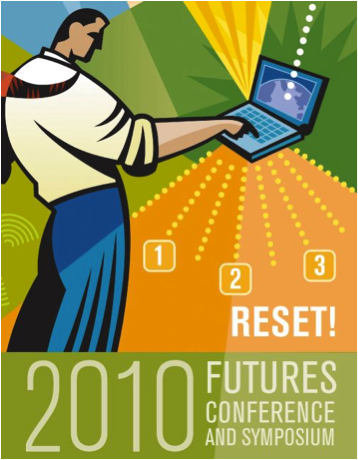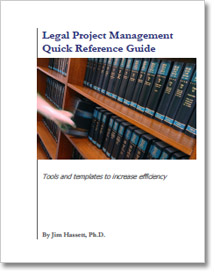
|
http://www.patrickmckenna.com/blog
Page << Prev 40 41 42 43 44 45 46 47 48 49 Next >> of 95
Post #490 – Wednesday, September 1, 2010
The Demand Side of The Market is Not Demanding
 We keep reading editorials about how the “clients are driving change” and one in today’s Financial Post about how the “clock is ticking on hourly billing.” Then from certain consultants come dire warnings about the potential obsolescence of law firms whose leaders are too clueless to see and react to the changes in the market (See my Post #489). On September 14, New York will host a one-day event entitled: The Client’s Revolution. What you should be demanding from your legal advisors in the 21st Century. We keep reading editorials about how the “clients are driving change” and one in today’s Financial Post about how the “clock is ticking on hourly billing.” Then from certain consultants come dire warnings about the potential obsolescence of law firms whose leaders are too clueless to see and react to the changes in the market (See my Post #489). On September 14, New York will host a one-day event entitled: The Client’s Revolution. What you should be demanding from your legal advisors in the 21st Century.
Client revolution indeed! Amongst all of this one sees a lot of smoke, but . . . where’s the fire?
Regular readers of my blog may remember my rant (#396) back on June 30 of last year, entitled: CLO’s Are Not Serious About Change. In that post I reported on an interesting experience working on behalf of an AmLaw listed, “Go-To” regional firm of over 500 attorneys. I spent two weeks initiating contact with the General Counsel of over thirty-five Fortune 500 Companies to explore their interest in investing one-hour to meet. The invitation was to discuss how this particular law firm could provide exceptional client service and deliver a potential savings of between 25 to 40 percent, or more. And that proposed savings was accompanied by specific details of guaranteed responsiveness, assured predictability, enhanced added-value, and references from some top New York based Fortune 50 existing clients. To my absolute chagrin, I confessed in my post that I completely struck out! No bunts, no hits, not even a sniff of interest. I subsequently heard back from a couple of GC’s via Legal OnRamp that . . . “unfortunately, change comes slowly.”
Well, fast forward a year and here’s an editorial from Alex Novarese at Legal Week, wherein Alex postulates that maybe someone called for a revolution but nobody came.
The harder I look at the profession the more convinced I become that clients - the demand side of the equation - are not only generally failing to enforce change, they are, if anything, more conservative than the law firms, which is saying something. What evidence is there that all but a few brave pioneers have even tried to make good on that vision? A financial crisis and a deep recession has hit Western economies and little has changed beyond a modest uptick in alternative billing. The internet? Disruptive technologies? Such trends have unquestionably forced more transparency onto the legal profession and in theory should give clients scope to take control of buying legal services. But, as yet, there has been little to back up the hype in terms of shaking up the industry or empowering clients.
Alex continues . . . outsourcing, offshoring and attempts to unbundle legal service provision - experiments in these areas are being pushed more by managing partners than pulled by clients. It was the same in earlier years when law firms went international, which was as much a strategic bet taken by the profession as a response to client demand.
As an explanation for this lack of urgency, one commentator suggested: Unlike the management in law firms, GCs don't change every few years - they stay in leadership posts and maintain old practices. Change will take time, but perhaps it will require a generational change inside the in-house world to really make a difference.
Perhaps the real mystery is why clients are quite so ready to tolerate the status quo. Why do some GCs make a show of complaining about the cost of legal services when they do almost nothing to materially change things?
 As yet another commentator opined: Perhaps, moaning about fees gives a sense they are responding to the predicament they are in, effectively signing blank checks for legal services on behalf of their company. But, the alternative - to do something about it, is not a strong enough driver for many GCs. One has to ask, what is the benefit to the GC in annoying law firms by driving down prices, demanding fixed fees, or insisting on other non-traditional methods? For many there is none. No one in the company is second-guessing the GC’s decisions, they can maintain the status quo unchallenged. The law firms they work with are doing all they can to assure the GC that the legal spend is justified. The GCs themselves are busy, have a team to worry about, and ultimately they are spending other people's (shareholder’s) money, not their own. For most GCs their salary is not directly linked to how efficient or inefficient their legal spending is. Perhaps if that changed then behavior would change too. But that means getting C-level people into the discussion and most have other things to worry about. As yet another commentator opined: Perhaps, moaning about fees gives a sense they are responding to the predicament they are in, effectively signing blank checks for legal services on behalf of their company. But, the alternative - to do something about it, is not a strong enough driver for many GCs. One has to ask, what is the benefit to the GC in annoying law firms by driving down prices, demanding fixed fees, or insisting on other non-traditional methods? For many there is none. No one in the company is second-guessing the GC’s decisions, they can maintain the status quo unchallenged. The law firms they work with are doing all they can to assure the GC that the legal spend is justified. The GCs themselves are busy, have a team to worry about, and ultimately they are spending other people's (shareholder’s) money, not their own. For most GCs their salary is not directly linked to how efficient or inefficient their legal spending is. Perhaps if that changed then behavior would change too. But that means getting C-level people into the discussion and most have other things to worry about.
In summary, there is little incentive to change business practices unless it benefits you. For many GCs the positive / negative impacts are still too slight. They are in an accountability blind-spot and few have someone going over their spending decisions with a critical eye. Most CEOs worry about their company winning the litigation, not whether the legal spend has risen by another “x” percent this year. It all makes one wonder: 'Who will put pressure on the GC to change?'
I remember an engagement that I was involved with in the early 90’s with McKinsey & Company. It involved helping “re-engineer” the legal department of a Canadian-based, international conglomerate to determine which law firm or combination of firms offered the best value proposition. Their strategic decision was whether to continue with the internal legal department as is, or whether they should shut down their internal legal capability and outsourcing all of the work. Only after the decision was made and the outside law firms were chosen did it occur to me that a couple of the choices of firms made, were not based on value at all, but were safety chutes for certain senior lawyers who would be remaining as employees within the legal department, should they ever decide or be forced to go back into private practice.
In the end things will change. Corporate behavior will slowly evolve; more CEOs and shareholders will take notice of legal spend as it grows and grows; GCs will adopt new practices simply because they don't want to stand out as someone who is not following what has become 'best’ practice. Things will change, but on the client side, it may yet be a long, protracted process.
Post #489 – Saturday, August 28, 2010
Can We Please Stop Crying Wolf?
 In preparation for my chairing and presenting to last week’s forum on ‘Overcoming Lawyers’ Resistance to Change’ I surveyed the dozens of participants and a good number of other managing partners. One of the common themes emerging from the feedback I received was numerous firm leaders who reported that much of the published hyperbole about some client revolution or how lawyers are genetically resistant to change is not at all helpful to their own internal efforts to mobilize partners. In preparation for my chairing and presenting to last week’s forum on ‘Overcoming Lawyers’ Resistance to Change’ I surveyed the dozens of participants and a good number of other managing partners. One of the common themes emerging from the feedback I received was numerous firm leaders who reported that much of the published hyperbole about some client revolution or how lawyers are genetically resistant to change is not at all helpful to their own internal efforts to mobilize partners.
These firm leaders cited examples of how certain consultants and commentators seem to relish playing on this theme by uttering dire warnings about the potential obsolescence of law firms with leaders too clueless to see and react to changes in the market.
It’s going to take a long time, and many lawyers won’t grasp the reality of the new environment until it’s too late.
The sooner we abandon the past, the better our chances of responding in time to survive in some recognizable and profitable form.
I think many underestimate the magnitude of the change that is looming, or the level of effort that will be required of firms to adapt … or die.
These solemn-faced experts, media rabble-rousers and all-knowing prophets compete in articles, speeches and blogs to get their warnings into our easily distracted heads. It is as if they believe that if they don't make their message apocalyptic, those they're trying to alert aren't going to pay attention.
Call it confidence or complacency or the calm before the storm, but our collective panic response seems to have been switched off. Fortunately (or to our inevitable detriment), many of us have lived through the treat of atomic annihilation, the predicted over-population bomb, the global shortage of oil and even Y2K only to see nothing of the envisaged calamities. Scary phrases such as economic meltdown, global pandemic and environmental catastrophe seem to describe our daily status quo. The human brain can function on high alert for only so long before it shifts to either rational decision-making or apathetic detachment. We require an accelerated arc in our disasters, a quick collapse and rapid recovery that suits our short attention spans.
Crying wolf, as even small children know from their scary bedtime stories, doesn't work well in the long run. So please, perhaps it is time that we all give it a rest.
Post #488 – Saturday, August 28, 2010
Thank You For Your Feedback
 Last week witnessed me spending a number of days at The University of Chicago’s Business School speaking to different groups of lawyers about critical leadership issues from the adaptive aspects of change, to how to transform your firm and even how to manage a group of professionals. When the dust finally cleared and the results were tabulated, I was both honored and humbled by the various critiques and feedback that participants kindly provided: Last week witnessed me spending a number of days at The University of Chicago’s Business School speaking to different groups of lawyers about critical leadership issues from the adaptive aspects of change, to how to transform your firm and even how to manage a group of professionals. When the dust finally cleared and the results were tabulated, I was both honored and humbled by the various critiques and feedback that participants kindly provided:
Patrick presented a good reminder of approach to managing change, specifically for law firms. Good tools to assist in development of change strategy. Appreciated time to reflect and think about change initiatives that I am involved with.
I've picked up some very practical types on how to introduce and lead change in a law firm. Thank you.
Good approach in advising on best ways to effectuate changes without telling us what changes we need to implement.
Very helpful explanations regarding: how attorneys tend to (and are trained to) approach potential change and the approach that actually is most effective.
Patrick’s presentation was . . . Worth the trip!
Very relevant for us at this time.
Great program! 10 pages of notes!
Thought provoking. A lot of good ideas.
Patrick's ability to start with an open-ended roundtable and end up, by the end of the day, covering all the listed topics in the syllabus, is impressive. This achievement is the result of mastery of the complex issues and his personal experience.
Excellent content. Very though provoking. Confirmed a number of good things that we are doing, but also raised additional things that we need to do / could be doing to ensure further success of the firm.
A lot to take in in one day but an excellent program that is implementable.
Very good presentation and knowledgeable.
Excellent program. Patrick knows professionals, how they interact and what motivates them.
Excellent presentation.
I thought Patrick was fantastic. I learned a lot and look forward to putting all the knowledge learned into action
Thank you all for making the preparation for these events worthwhile.
Post #487 – Friday, August 27, 2010
Dealing With Malicious People
Last week I conducted my bi-annual one-day masterclass for practice group leaders at the University of Chicago. One of the participants asked a provocative question . . . how do you deal with that extremely talented, but narcissistic professional that occasionally can be just outright malicious towards you?
My response went something like this . . .
 We all encounter personal and professional rip tides. It may be the fates, bad luck, others' doing, or an accidental confluence of unfortunate events that we inadvertently create or exacerbate. Someone who is insensitive, rude or verbally hostile is often trying to assuage their own demons by striking out at others. Understand this is the other person's problem and not yours. If they had honorable intentions, they would attempt to communicate, negotiate or work with you, not try to undermine you. We all encounter personal and professional rip tides. It may be the fates, bad luck, others' doing, or an accidental confluence of unfortunate events that we inadvertently create or exacerbate. Someone who is insensitive, rude or verbally hostile is often trying to assuage their own demons by striking out at others. Understand this is the other person's problem and not yours. If they had honorable intentions, they would attempt to communicate, negotiate or work with you, not try to undermine you.
Use perspective. It's not even a major event in your life. Keep above the fray. Though it may seem satisfying to strike back, that is usually what this other person desires – to see that they've impacted you. You may need to move away, to turn the page, to start something else. No one is a lesser person for avoiding unnecessary unpleasantness in life. It is not a commentary on your courage, intelligence, or confidence to simply walk away from continuing disaster. Remember they only end up punching at shadows when there is no opponent.
Take a deep breath. Wait a day. If some response is merited, take some time to ensure that it's measured, proportional and not emotionally overwrought.

Post #486 – Thursday, August 19, 2010
The New Business of Practicing Law
 Join me at the 2010 Futures Conference. The American University Washington College of Law and The College of Law Practice Management and are hosting “1, 2, 3, RESET! Getting Back to the NEW Business of Practicing Law” on October 22 and 23 at the AU (American University Washington College of Law - 4801 Massachusetts Avenue, NW) in Washington DC. Join me at the 2010 Futures Conference. The American University Washington College of Law and The College of Law Practice Management and are hosting “1, 2, 3, RESET! Getting Back to the NEW Business of Practicing Law” on October 22 and 23 at the AU (American University Washington College of Law - 4801 Massachusetts Avenue, NW) in Washington DC.
I encourage anyone interested in the future of the legal market and law practice management to attend. Attendance at this conference is being limited to 150 attendees so as to ensure high quality discussion.
This conference is for law firm leaders, managing partners, executive directors, c-suite law firm officers, consultants, law school deans and anyone else who plays a leading role in the business of practicing law.
I will be addressing the topic of "Developing and Choosing Leaders for the New Generation and Beyond". Other topics include Inside the New Law Firm; Hitting The Reset Button; and a wrap up session Now What? led by American Lawyer editor Aric Press.
I hope to see you there.
Post #485 – Wednesday, August 11, 2010
Evaluating Your Performance As A Managing Partner
 I had the honor of writing the feature article for the Canadian Bar Association’s PracticeLink. This is an e-newsletter that is published twice annually specifically for Law Firm Leaders and the newest issue is just about to be released. I had the honor of writing the feature article for the Canadian Bar Association’s PracticeLink. This is an e-newsletter that is published twice annually specifically for Law Firm Leaders and the newest issue is just about to be released.
Here is an advanced peak at the article entitled: Evaluating Your Performance As A Managing Partner.
I’d welcome your comments.
Post #484 – Wednesday, August 11, 2010
An Irrational Form of Leverage
Regular readers of this blog will know that I have a keen personal interest in economics, was among the first within the profession to predict the current recession, and have been virtually alone in suggesting to client firms that they need to measure their strategic plans against an economic slowdown that will likely continue for some years yet. In the process of pursuing my interest I have developed a camaraderie with a number of astute economists whom I respect and whom provide me with their insightful opinions from time to time.
 As was true of the ominous position that the real estate sector found itself in. some years back, now in an entirely different sector the clouds are turning black once again. Strip out the finer details, and you'll find the very same mechanics that brought the sub-prime housing market from boom to bust: As was true of the ominous position that the real estate sector found itself in. some years back, now in an entirely different sector the clouds are turning black once again. Strip out the finer details, and you'll find the very same mechanics that brought the sub-prime housing market from boom to bust:
. widespread investor acceptance
. complicated derivatives
. intense incentives for banks to make deals
. boneheaded assumptions of endless return on investment
. under-qualified borrowers
. stunning amounts of leverage and debt
. loosely regulated multi-trillion-dollar market
. overstated credit ratings from Wall Street
. social and political pressures to maintain growth
This crisis-yet-to-be is . . . municipal bonds and here is what I learned through an e-mail last week from one of my economist buddies:
Munis have been a long-standing pillar of stable return. Only bonds from sovereign governments and blue chip corporations have a better reputation for credit-worthiness than munis. So when a city or state sells bonds to build a new school, sewer or stadium, investors form a line around the block. In the history of the union, only one US state has ever defaulted on its debt (Arkansas 1934). A few cities here and there have also done so. In other words, munis have performed admirably over the years.
But reputations, as this credit crisis has taught the world, no longer mean jack. Though vast and complicated, the root of American municipalities is like any business or household: Money goes in, money goes out. Money comes in mostly from taxes and revenue streams such as utilities and tolls. Money goes out to finance municipal government payrolls and public works programs. Cities and states sell bonds when they either can't pay upfront for such needs. No big deal . . . at least, it wasn't a big deal until recently.
In this era of high unemployment and shrinking economies, municipal revenues are hurting. Tax revenue tends to be lower with 15 million Americans out of work. And so, not surprisingly, municipalities are struggling to cut spending in line with lost revenue. But their biggest expense of all is untouchable - pension plans. California offers a telling example. A recent Stanford study concluded that the state pension fund program is under-funded by roughly $500 billion. The researchers urged Gov. Schwarzenegger to inject $360 billion into its public benefit systems - right now - to have an 80% chance of meeting 80% of obligations over the next 16 years. Facing a $20 billion state budget gap, what can he possibly do?
The problem, just like with subprime, is an irrational form of leverage. In essence, municipalities borrow current earnings of public employees in exchange for some of the most favorable retirement plans in the world. That borrowed money is invested aggressively, just like a private-sector employee would in his 401(k). Except if the fund loses money, which they all have over the last 10 years, pension funds don't adjust payouts. The social and political pressure to maintain the status quo - keeping our public employees comfortably retired - is just too strong.
So municipalities kick the can down the road. New employees buy into the funds. Fund managers maintain their projections of endless 8% annual returns. Retirees keep taking out the funds they were promised . . . and no one pays the tab. And it's not just California. Orin Cramer, chairman of New Jersey's pension program, estimates a national funding gap of around $2 trillion.
 The municipal bond market is roughly $2.7 trillion. If Cramer is on target, that's a total liability about the size of France and Britain's annual GDP - combined. Therefore, in yet another subprime redux, Wall Street has found a way to make the muni bond problem even worse. Like the mortgage market, the municipal bond market has morphed into its own new era of highflying finance, adjustable-rate loans and complex securities. The municipal bond market is roughly $2.7 trillion. If Cramer is on target, that's a total liability about the size of France and Britain's annual GDP - combined. Therefore, in yet another subprime redux, Wall Street has found a way to make the muni bond problem even worse. Like the mortgage market, the municipal bond market has morphed into its own new era of highflying finance, adjustable-rate loans and complex securities.
Of course, what modern catastrophe is complete without a credit ratings debacle? According to the National Conference of State Legislatures, 34 states are projecting budget gaps for 2010. The total shortfall will likely exceed $84 billion. Yet only two US states, California and Illinois, are currently rated lower than AA by Standard & Poor's. Only four states have fully funded pension programs. Yet 11 have S&P's coveted AAA credit rating.
Given the ratings agencies' track record over the last 10 years, those AA and AAA ratings seem woefully optimistic. Insolvent is insolvent, not matter what the rating agency's say.
Post #483 – Friday, August 6, 2010
An Aggressive AFA Marketing Campaign
 I received an email today confirming that UK-based CMS Cameron McKenna has launched a major alternative fee campaign in an attempt to boost client loyalty and attract new business. I received an email today confirming that UK-based CMS Cameron McKenna has launched a major alternative fee campaign in an attempt to boost client loyalty and attract new business.
The firm is offering a 'no questions asked' fixed-fee payment system, which would see clients pay for legal advice on a regular monthly basis. As part of the campaign, Camerons sent 3,500 clients information about available alternative billing options (Have a look at a copy of CMS Brochure: The Future of Fees), including five specific alternative fee arrangements.
The guidelines come with a scorecard that lists the factors that make a client eligible for a reduction in fees, which include:
• paying bills within 14 days;
• giving Camerons more than 33% of all legal work;
• supplying work across practice groups; and
• agreeing to an associate as the main point of contact at the firm rather than a partner.
CMS senior partner Richard Price commented: "This is part of a campaign to set ourselves apart from competitors, but there are also some clients that need help in understanding how these arrangements work. There is a lot of talk about value for money and fees but it doesn't provide you with much substance. These guidelines, while not comprehensive, give a good idea of how the client can achieve better value."
Camerons claims that one marguee client has already signed up to the arrangement for a year, and that it is in talks with others about similar deals.
I think that this is an aggressive move that is destined to stimulate more than a few copycats!
Post #482 – Sunday, August 1, 2010
The Worst Thing About Best Practices
Mike McLauglin and I have long had a mutual admiration for each others work and he kindly sent me a copy, some months back, of his latest writings, Winning The Professional Services Sale which I heartily recommend reading. Well, I just came across this article about Best Practices that Mike authored and wanted to share an excerpt with you:
 It’s tough to pinpoint when copying some other law firm’s tactics morphed into “adopting best practices,” but somewhere along the line it did. The notion that an organization can transplant the ideas of another has become so widespread that it’s no wonder so many professional firms look remarkably alike. It’s tough to pinpoint when copying some other law firm’s tactics morphed into “adopting best practices,” but somewhere along the line it did. The notion that an organization can transplant the ideas of another has become so widespread that it’s no wonder so many professional firms look remarkably alike.
Of course, there is value in learning from others’ experience and success. It’s natural to look at how another firm (especially a competitor) created a new market opportunity. Many firms face the same kinds of challenges, so applying others’ tested strategies and tactics often seems like the ultimate shortcut to salvation. But too often, following others’ practices results in wasted investment and disappointment when the results fall short of their original application. Here are four reasons you should dump best practices:
They rarely work. A firm’s best practices—however widely admired—function in the context of its particular organization’s processes, culture, systems, and people. Plucking a practice from the situation that brought it forth and trying to graft it onto another firm produces results that are by no means guaranteed.
It’s a follower’s strategy. In an era when clients demand creativity and innovation, why follow someone else’s lead? In the long run, relying on best practices will doom you to mediocrity. Instead of getting bogged down trying to reverse-engineer the strategies of others, find your own path. Be the leader, not the follower.
Change comes from within. People rarely respond well to implementing some other firm’s ideas. In fact, best practices that come from on high usually cause resentment. Let people create their own solutions using their in-depth knowledge of your firm’s clients, suppliers, employees, and processes. That will result in ownership of the ideas and determination to get results.
They don’t come with a manual. Business books and benchmark reports are full of snippets about best practices, but they rarely explain what to do with them.
The problem with best practices is this: Using them as a guide lulls people into thinking that a practice already exists, tested and ready, and can be successfully transplanted. When you import a practice, thoughts immediately turn to how to implement that practice, when you should instead focus on what needs to be done and why. If you begin with a predetermined solution, you’re more likely to overlook innovative ideas right under your nose.
MICHAEL W. MCLAUGHLIN is a principal with MindShare Consulting LLC, a firm that creates sales and marketing strategies for professional services companies. He is co-author of Guerrilla Marketing for Consultants and author of Winning the Professional Services Sale and the newsletters Management Consulting News and The Guerrilla Consultant.
Post #481 – Friday, July 30, 2010
July Soundings: Tidbits of Interest
• I’m currently reading . . .
A couple of great articles – ALL well worth your reviewing:
- 12 Guidelines For Law Firm Marketing Investments is written by Jim Stapleton, CEO at Fenwick & West and provides some much needed counsel on how to sort through that myriad of wonderful opportunities for blowing your marketing budget. Jim states, “I wrote the article after years of mild to medium frustrations with both partners and vendors who don’t seem to understand how and why we invest in specific activities.”
- The Law Firm Paradigm: Relevant or Relic? by Timothy J. Waters, a senior partner at McDermott Will & Emery. Tim tells me that “This article is based on my personal observations as an individual who recruited many, many lawyers from a spectrum on law firms in the US and Europe. My goal is to precipitate a debate and (hopefully) some introspection among and between law firm managers.”
• And while I’m on the subject . . .
 Jim Hassett’s new Legal Project Management Quick Reference Guide packs an impressive amount of techniques, tools, and templates into104 pages. Written for use as training material in LegalBizDev's workshops and coaching and as a resource afterwards, the Guide is designed as a ready reference, organized so that readers can look up material to help them with a specific need, rather than as a manual to be read from start to finish. Its purpose is to help law firms rapidly apply the key principles and tools of project management that will "have the greatest impact for each individual practice." Jim Hassett’s new Legal Project Management Quick Reference Guide packs an impressive amount of techniques, tools, and templates into104 pages. Written for use as training material in LegalBizDev's workshops and coaching and as a resource afterwards, the Guide is designed as a ready reference, organized so that readers can look up material to help them with a specific need, rather than as a manual to be read from start to finish. Its purpose is to help law firms rapidly apply the key principles and tools of project management that will "have the greatest impact for each individual practice."
• I’m enjoying . . .
A new website that represents the latest time-waster - I Write Like was created by Dmitry Chestnykh and allows you to paste a short writing sample in a box and click the “analyze” button. The site then examines word choice, sentence length and punctuation in comparison to the works of 50 famous writers in its database and, within seconds, spits back the name of the author your writing most closely resembles. Apparently with one of my articles I write like H.P. Lovecraft . . . "the American writer of the twentieth century most frequently compared with Poe in the quality of his thematic preoccupation with the obsessive depiction of psychic disintegration in the face of cosmic horror." Ouch!
• I’m fascinated by the views of . . .
Professors Gregory Northcraft and Kevin Rockman who put a group of more than 200 participants through separate teamwork exercises – face-to-face and e-mail and video-conferencing. The groups that met face-to-face were more trusting and cooperative than the groups that negotiated by e-mail. Their study shows that face time allows us to assess our colleague’s trustworthiness, typically based on visual clues such as tone of voice and facial expressions. Meanwhile, e-mail can give users a sense of anonymity that can bring out the worst in people – they write things they might never say. (Can you imagine?) “Face to face, people have more confidence that others will do what they say they’ll do. Over e-mail, they trust each other less, claimed Northcraft, professor of executive leadership at the University of Illinois.
• I’m relieved to know . . .
M&A Activity is forecasted to increase. IntraLinks recently commissioned mergermarket to conduct a survey of 160 Global M&A professionals to gather their opinions on a number of issues including the post-global financial crisis, the current economic and dealmaking environment as well as the key challenges and opportunities market participants will face in the coming year. Respondents were drawn from Europe, North and South America, Japan, Australia and South East Asia and represented the corporate, financial, legal and private equity communities. A couple of Highlights:
- In a vote of confidence for the future of M&A, which for a time looked very bleak, respondents from all regions expressed a high level of optimism about the level of dealmaking to come. Indeed, 78% of all respondents expect the level of dealmaking in their region to increase over the next 12 months. Understandably, this level of confidence was even higher in the hard-hit North American market – here 89% of the region’s respondents felt deal flow would ‘increase’ or even ‘increase greatly’ over the year to come.
- Given the sheer number of deals that have been announced in the Energy, Mining & Utilities space over the past years it is at times difficult to believe that there can be more to come. However, 55% of all respondents predict that this sector will see the bulk of deal
flow in their region. Technology, Media & Telecommunications was just ahead of this at 56%. Of course, one must consider the fact that buyers in China and India are still scouting the world over for attractive targets in the Energy and Mining space to address the ever expanding energy needs of each respective country.
• I’m pleased to report . . .
 Our August 16 forum entitled Overcoming Lawyers’ Resistance to Change has been fully subscribed such that Ark is now planning a second session in New York on Tuesday, January 25, 2011. I’m honored to be able to participate again in this second session with the same faculty members as scheduled to appear at the University of Chicago. Our August 16 forum entitled Overcoming Lawyers’ Resistance to Change has been fully subscribed such that Ark is now planning a second session in New York on Tuesday, January 25, 2011. I’m honored to be able to participate again in this second session with the same faculty members as scheduled to appear at the University of Chicago.
Page << Prev 40 41 42 43 44 45 46 47 48 49 Next >> of 95
|
|


 Ashridge House
Ashridge House  11226 - 60 Street
11226 - 60 Street  Edmonton, Canada
Edmonton, Canada  T5W 3Y8
T5W 3Y8